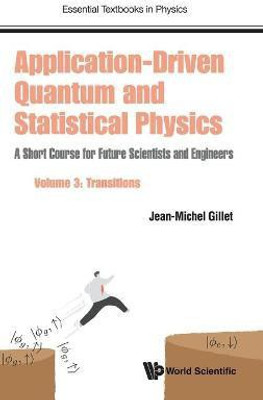Application-driven Quantum And Statistical Physics: A Short Course For Future Scientists And Engineers - Volume 3: Transitions(English, Hardcover, Gillet Jean-michel)
Quick Overview
Product Price Comparison
Bridging the gap between traditional books on quantum and statistical physics, this series is an ideal introductory course for students who are looking for an alternative approach to the traditional academic treatment.This pedagogical approach relies heavily on scientific or technological applications from a wide range of fields. For every new concept introduced, an application is given to connect the theoretical results to a real-life situation. Each volume features in-text exercises and detailed solutions, with easy-to-understand applications.This third volume covers several basic and more advanced subjects about transitions in quantum and statistical physics. Part I describes how the quantum statistics of fermions and bosons differ and under what condition they can merge into the classical-particle-statistics framework seen in Volume 2. This section also describes the fundamentals of conductors, semiconductors, superconductors, superfluids and Bose-Einstein condensates. Part II introduces time-dependent transitions between quantum states. The time evolution of a simple two-level model gives the minimum background necessary to understand the principles behind lasers and their numerous applications. Time-dependent perturbation theory is also covered, as well as standard approaches to the scattering of massive particles. A semi-classical treatment of electromagnetic field-matter interaction is described with illustrations taken from a variety of processes such as phonon scattering, charge distribution or spin densities. The third and last part of the book gives a brief overview of quantum electrodynamics with applications to photon absorption or emission spectroscopies and a range of scattering regimes. There follows a short introduction to the role of multiphoton processes in quantum entanglement based experiments.


